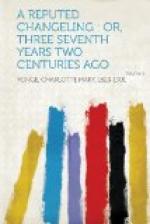He would tell of his putting a hornet in a sluttish maid’s shoe, which was credible, if scarcely meriting that elfish laughter which made his auditor shrink, but when he told of dancing over the mud banks with a lantern, like a Will-of-the-wisp, till he lured boats to get stranded, or horsemen to get stuck, in the hopeless mud, Anne never questioned the possibility, but listened with wide open eyes, and a restrained shudder, feeling as if under a spell. That mysterious childish feeling which dreads even what common sense forbids the calmer mind to believe, made her credit Peregrine, for the time at least, with strange affinities to the underground folk, and kept her under a strange fascination, half attraction, half repulsion, which made her feel as if she must obey and follow him if he turned those eyes on her, whether she were willing or not.
Nor did she ever tell her mother of these conversations. She had been rebuked once for repeating nurse’s story of the changeling, and again for her shrinking from him; and this was quite enough in an essentially reserved, as well as proud and sensitive, nature, to prevent further confidences on a subject which she knew would be treated as a foolish fancy, bringing both herself and her companion into trouble.
CHAPTER V: PEREGRINE’S HOME
“For, at a word, be it understood,
He was always for ill and never for good.”
Scott.
A week had passed since any of the family from Oakwood had come to make inquiries after the convalescent at Portchester, when Dr. Woodford mounted his sleek, sober-paced pad, and accompanied by a groom, rode over to make his report and tender his counsel to Major Oakshott. He arrived just as the great bell was clanging to summon the family to the mid-day meal, since he had reckoned on the Squire being more amenable as a ‘full man,’ especially towards a guest, and he was well aware that the Major was thoroughly a gentleman in behaviour even to those with whom he differed in politics and religion.
Accordingly there was a ready welcome at the door of the old red house, which was somewhat gloomy looking, being on the north side of the hill, and a good deal stifled with trees. In a brief interval the Doctor found himself seated beside the pale languid lady at the head of the long table, placed in a large hall, wainscotted with the blackest of oak, which seemed to absorb into itself all the light from the windows, large enough indeed but heavily mullioned, and with almost as much of leading as of octagons and lozenges—greenish glass—in them, while the coats of arms, repeated in upper portions and at the intersections of beams and rafters, were not more cheerful, being sable chevrons on an argent field. The crest, a horse shoe, was indeed azure, but the blue of this and of the coats of the serving-men only deepened the thunderous effect of the black. Strangely, however, among these sad-coloured men there moved a figure entirely differently. A negro, white turbaned, and with his blue livery of a lighter shade, of fantastic make and relieved by a great deal of white and shining silver, so as to have an entirely different effect.




